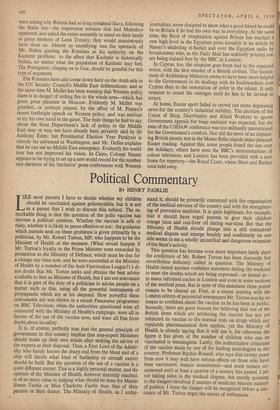Portrait of the Week
You were wrong, and you will pay, Comrade Rubashov. The Party promises only one thing : after the victory, one day when it can do no more harm, the material of the secret archives will be published. Then the world will learn what was in the background of this Punch and Judy show. . . . And then you, and some of your friends of the older genera- tion, will be given the sympathy and pity which are denied to you today.
MODESTLY Arthur Koestler has refrained from quoting from his Darkness at Noon, while one by one the old Communists,. liquidated on Punch Stalin's orders, are rehabilitated—the wretched Laszlo Rajk being the most recent. Possibly Mr. Koestler has been kept too busy combating the Home Office's attempts to purge him. He and the Observer are to make a formal request to the Press Council for an investigation into the Home Office's notable record of evasions and inaccuracies about their instructions to prison governors, and about Mrs. Thompson, concerning which Major Lloyd George and his Under-Secretary, Lord Mancroft, appear to be playing a game of Touch Last, to see who can make the Ministry look more foolish.
Mr. Koestler must be one of the very few interested parties who has not been heard on the subject of the Party; for what with one thing and another, Communism has spread itself all over the news during the week. Mr. Malenkov, in particular, has been doing his best to convince us that he is a nice cosy fat fellow, with a. human interest in window-shopping; not at all an ogre. Then there has been the CP Congress, even more comical than usual. In spite of a few rude deviationists—who were asking why Britons had so long remained Slays, following the Stalin line—the impression remains that had Malenkov appeared, and asked the entire assembly to stand on their heads in pious memory of Leon Trotsky, they would unanimously have done so. Almost as unedifying was the spectacle of Mr. Nehru quoting the Russians as his authority on the Kashmir problem : to the effect that Kashmir is historically Indian, no matter what the population of Kashmir may feel. The Portuguese, clinging on to Goa, should be grateful for this type of argument.
The Russians have also come down hard on the Arab side in the UN Security Council's Middle East deliberations; and at the same time M. Mollet has been warning that Western policy there is in danger of setting fire to the whole area—which has given great pleasure in Moscow. Evidently M. Mollet was gratified, or perhaps piqued, by the effect of M. Pineau's recent forthright speech on Western policy, and was anxious to try his own hand in the game. The rude things he had to say about the State Department's lack of policy in the Middle East may or may not have already been privately said by Sir Anthony Eden; but Presidential Election Year Paralysis is already far advanced in Washington, and Mr. Dulles explains that he can see no Middle East emergency. Evidently his world tour has not improved his vision. In Cairo, Colonel Nasser appears to be trying to set up a new world record for the number and duration of his 'exclusive' press conferences with Western journalists, some designed to show what a good friend he could be to Britain if he had his own way in everything. At the same time, the flood of vituperation against Britain has reached a new high level in the Egyptian press (notably in an article by Nasser's underling el-Sadat) and over the Egyptian radio by broadcasters who, as the Daily Mail has unkindly pointed out, are being trained free by the BBC in London.
In Cyprus, too, the situation goes from bad to the expected worse, with the first murder of a British civilian. The banish- ment of Archbishop Makarios seems to have been more helpful to the Government in its dealings with its backbenchers over Cyprus than to the restoration of order in the island. It only remains to count the outrages until he has to be invited to 'return.
At home, Easter sport failed to crowd out some depressing news for the country's industrial stability. The decision of the Union of Shop, Distributive and Allied Workers to ignore Government appeals for wage restraint was expected, but the tone of the USDAW conference was too militantly unrestrained for the Government's comfort. Nor did the news of an impend- ing British atomic test in the Monte Bello islands make pleasant Easter reading. Against this, some people found the sun over the holidays; others have seen the BBC's demonstrations of colour television; and London has been provided with a new home for repertory—the Royal Court, where Shaw and Barker once held sway.

















































 Previous page
Previous page